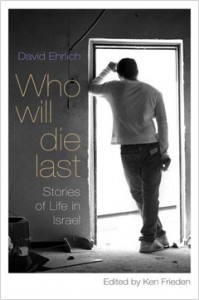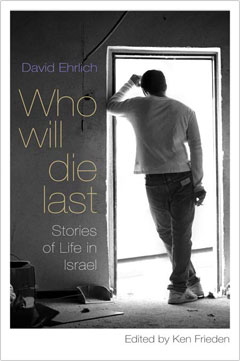 Who Will Die Last? Stories of Life in Israel
Who Will Die Last? Stories of Life in Israel
by David Ehrlich
Syracuse Univ. Press. 154 pages, $19.95
STAND IN LINE to enter a movie theater in Israel, and it’s a good bet the stranger behind you will enter your conversation to offer an opinion about whatever you’re discussing with your date. Israel is small enough to view itself as a family. Indeed, Israeli society is personal in a way that erases personal boundaries. To us Israelis, your business is my business, never mind that we’ve just met; I just want to help. In a country where the ethos of family prevails over formality, being openly gay means everyone around you will have something to say about it, often affirmingly. After all, if little else is your own business, why would being gay be?
Such is the sociological landscape for the seven short stories about gay life in Israel that appear among the 21 in Who Will Die Last? by the gay Israeli author David Ehrlich. Ehrlich, who is 54, is also the owner of Tmol Shilshom, a café in Jerusalem that’s popular with literary types.
Two of the most engaging pieces see a protagonist torn between a private life abroad and family life in Israel. In “It’s All Right,” a gay Israeli living in the U.S. is overwhelmed with nostalgia when his parents pay him a visit. This protagonist remains in America, but the one in another story, “Stars,” opts to return to Israel, leaving his boyfriend in London to move back to his childhood home in Jerusalem.
Opportunities for escape could also be found closer to home. In Ehrlich’s rendering, the army, that formative experience for Israeli youths, is the improbable environment for self-exploration. “On Reserve,” the longest piece, follows a man who, year after year while on reserve duty away from his wife and children, falls into the habit of having gay sex. Everything is in check until he falls for a young gay soldier on active duty.
This reserve soldier is the most closeted character to be found throughout the book, while the young soldier seems already to be coming out. Their age difference may represent a generational gap in Israeli society, for the older man, who still has a foot in the closeted past, regards being gay as first and foremost about sex, while the younger man confidently declares his gayness as a personal identity, one that allows for love along with sexual desire. The first, never fully comfortable with being gay, must struggle to accept himself; the latter, for whom being gay is entirely natural, demands acceptance from others. In “The Life and Death of Frank 22,” a 42-year-old man invents an on-line persona of a 22-year-old that is showered with the virtual attention he could never draw “IRL” (in real life).
Not all the stories are equally strong. Ehrlich can be moralizing, especially when he treads on political metaphors in his “straight” stories. When he digresses from the Israeli mainstream to make an “inclusive” point, he often misses the mark. “Vadim” is probably intended as a humanizing amplifier of Israeli minorities, but this short monologue in broken language by an immigrant from Russia who accidentally shot an Arab boy has a patronizing ring to it. Another problem is that several pieces feel like a sketch in need of development.
Still, Ehrlich is an insightful commentator about Israeli society. Take the fast-paced “To The Limit,” in which a driver on a highway fends off an attempt to cut him off. He then goes out of his way to make sure the other, equally dogged driver will not get ahead of him. The aggressive yet friendly game of chicken continues until the drivers run out of road upon hitting the country’s border.
Ehrlich is at his best when writing in a gay voice on gay themes. He describes with depth and honesty the loneliness and insecurity that many gay readers have experienced, regardless of where they live. In “Alone,” a man must spend a weekend away from his boyfriend and finds even this brief separation hard to take. So his friends drop in unannounced to keep him company until his boyfriend gets back. Thus, the universal experience of loneliness is alleviated by the Israeli style of friendship. If it’s an exaggeration to say that the Israeli and gay identities reinforce each other, at least Ehrlich’s gay experience has a distinctly Israeli color.
Yoav Sivan is an Israeli journalist based in New York. He maintains a website at www.YoavSivan.com.






